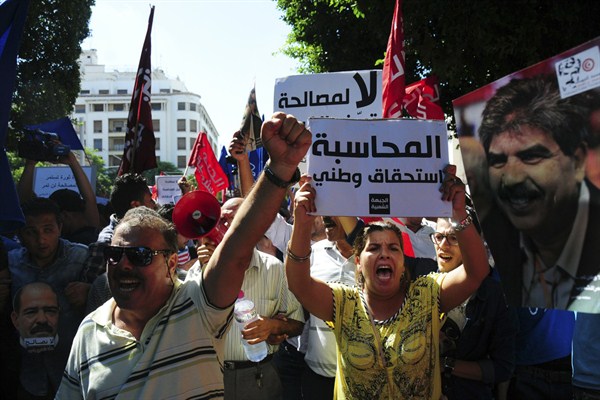On Saturday, Tunisians flocked to Avenue Habib Bourguiba, in Tunis, to protest a draft law on “economic reconciliation,” which parliament approved in July. The initiative—strongly backed by President Beji Caid Essebsi’s Nidaa Tounes party—would freeze prosecutions of officials and businessmen from ousted President Zine el Abidine Ben Ali’s era who are being investigated for corruption, and create a special committee to which they would reveal their assets. Those funds would then, the government says, be injected into Tunisia’s flailing economy.
Critics point to the evident impunity the law would grant to those guilty of corruption or embezzlement, further undermining Tunisia’s fragile democracy. The corruption and cronyism that characterized Ben Ali’s regime were central rallying points in the 2011 uprising that led to his ouster. The initiative compounds many citizens’ worries that Nidaa Tounes, which includes a number of former members of Ben Ali’s now defunct party, the Democratic Constitutional Rally, has little interest in tackling those problems.
“Sure, the president announced the bill as a plan to save the Tunisian economy, but [he] didn’t present any scientific or economic study to substantiate that claim. The draft offers no statistics, projections of economic recovery or details on just how much money would be reinvested,” explains Amna Guellali, Tunisia and Algeria researcher at Human Rights Watch, in an email interview. “It’s a purely political project with unclear economic impact that will very clearly undermine transitional justice and the general political climate,” she adds.

